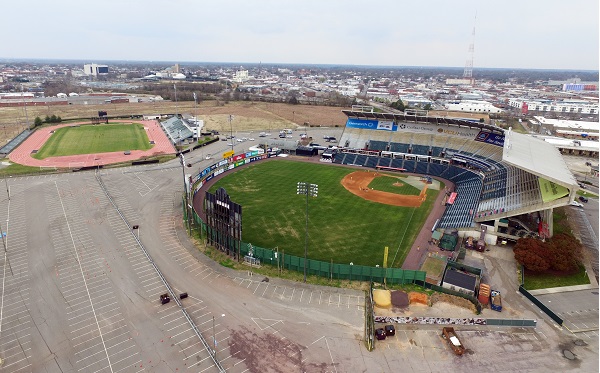
The area that makes up the Diamond District includes the namesake baseball stadium and nearby Sports Backers Stadium. (BizSense file images)
Proposals are in, and now it’s up to city officials to decide which development team Richmond will work with on its Diamond District redevelopment project.
Full proposals from the finalists that remain in contention for the 67-acre stadium-anchored project were due to the city by 3 p.m. Tuesday. Each of the three teams met that deadline, confirmed Maritza Pechin, the city’s Diamond District project manager.
Pechin said the proposals will now be reviewed by the project’s evaluation panel, which will make a recommendation to Mayor Levar Stoney. A final development agreement or contract would require City Council approval via a seven-vote supermajority.
Vying for the project are Richmond Community Development Partners, led by Machete Group, JMA Ventures and Tryline Capital; RVA Diamond Partners, led by Republic Properties Corp., Thalhimer Realty Partners and Loop Capital; and Vision300 Partners, led by Freehold Capital Management with members including Brookfield Properties and Hourigan.
The panel’s review is to be based on evaluation criteria spelled out in the project’s solicitation documents. Criteria includes development team qualifications, experience with urban mixed-use projects, equitable development benefits, and project understanding and financing approach.
The development team selection is expected to be made in July and the project put to the City Council for approval this fall.
The same panel selected the finalists, which were narrowed down from a field of 15 respondents to the project’s initial solicitation late last year. The three remaining teams were then invited to submit full proposals in response to a formal request for offers that went out in May.
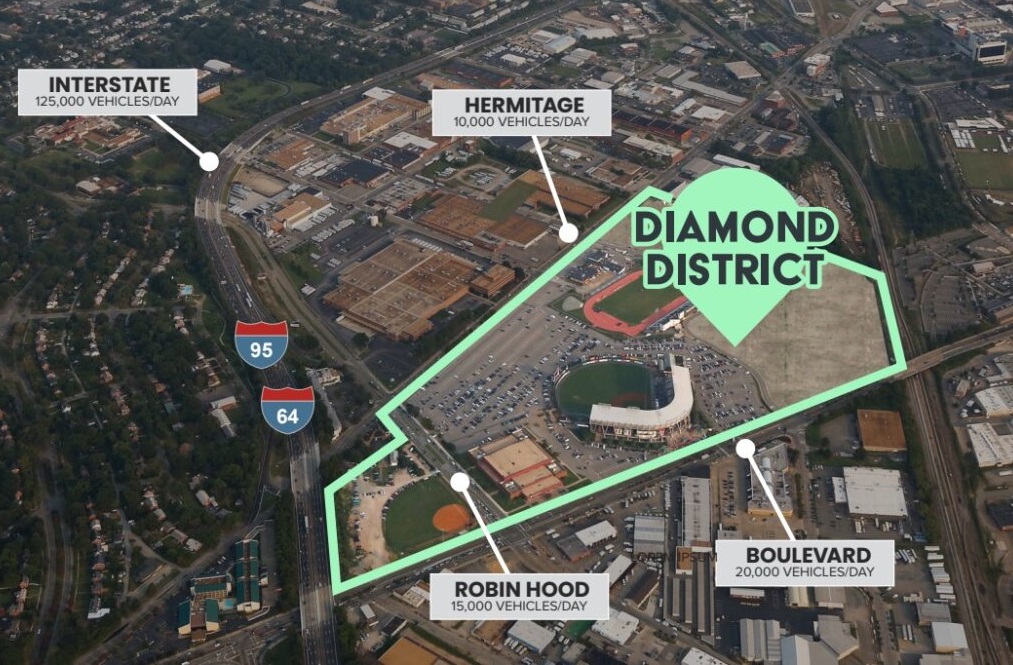
The 60-plus acres are bordered by Arthur Ashe Boulevard, Hermitage Road, the interstate and the railroad tracks.
The winning team will work with the city to redevelop the largely city-owned site, which includes The Diamond and the VCU-owned Sports Backers Stadium. The 37-year-old Diamond has been deemed unfeasible for renovation and would be replaced with a new 10,000-capacity stadium that would anchor the larger mixed-use development.
The city’s solicitation calls for office, residential, retail, a hotel and infrastructure upgrades. The residential component would consist of rental and for-sale homes targeted to a mix of income levels.
Bordered by Arthur Ashe Boulevard and Hermitage Road to the west and east, and by the interstate to the north and the train tracks to the south, the site has been floated for redevelopment in starts and stops for over a decade.
This latest effort is driven in large part by a deadline set by Major League Baseball for all pro baseball venues to meet new facility standards by the start of the 2025 season. The Richmond Flying Squirrels has been promised a new ballpark since the Double-A club’s arrival in 2010.
In preparing their submissions, the three teams were allowed to submit additional questions about the project. Those questions were posted, along with the city’s responses, on the city’s Diamond District webpage earlier this month.
A question from one of the teams stated its total development budget, including construction costs, would be between $1.5 billion and $2 billion. The team behind each question is not identified in the document.
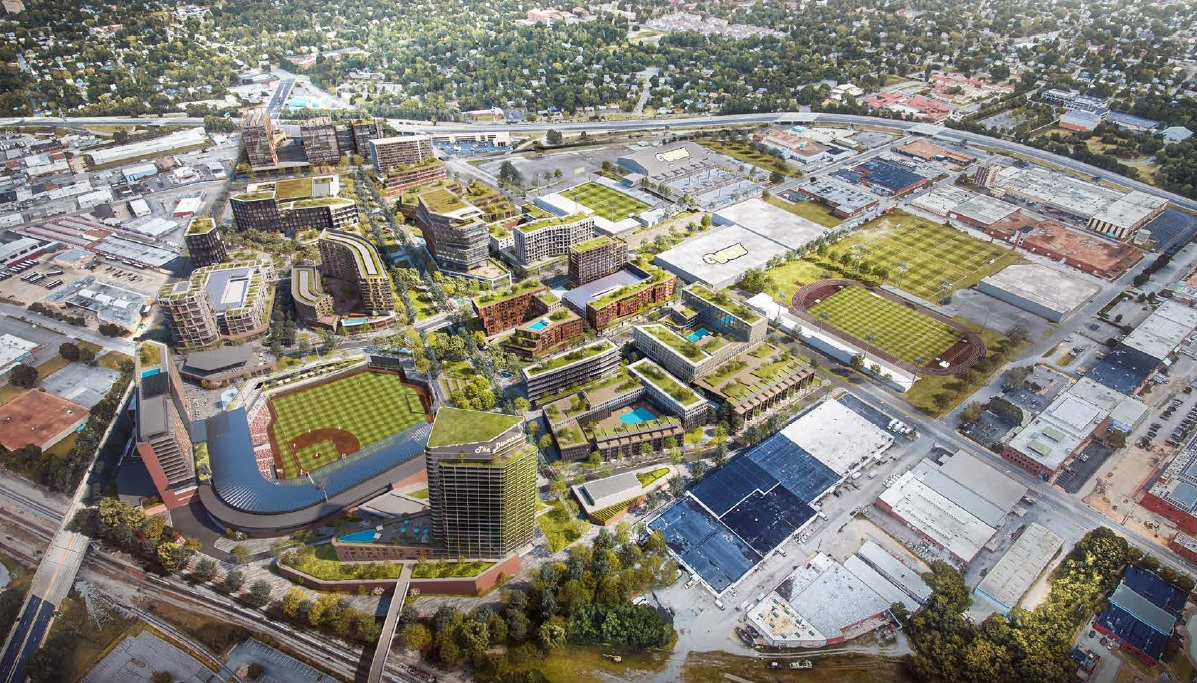
A conceptual rendering of Richmond Community Development Partners’ proposal. (Images courtesy of the City of Richmond)
Also this month, at least one of the teams ramped up its public profile. Richmond Community Development Partners launched Facebook and Twitter accounts promoting its team members and their portfolios. Posts have included a two-minute video with interviews from several of the team’s members.
Among those featured in the video are Colin Robinson with Gilbane Building Co., Stewart Roberson of Moseley Architects, Megan Gough of VCU’s School of Urban Design, Augusta Hite of HandUp Resource Center, Charles Wilson of CW Consulting Group, Shawn Balon of Storefront for Community Design, and Jerome Legions of Carver Civic Association.
Machete Group’s David Carlock said such presence on social media is important for public outreach.
In an email, Carlock said, “Taking advantage of all the ways to engage with the community — so community members can get to know us and understand our vision and so we can hear from them — is really important. Social is one way for us to do that.”
In a statement Tuesday, the RVA Diamond Partners team said of its proposal: “It captures the essence of what makes Richmond a special place while maintaining the spirit of the Richmond 300 plan — and perhaps most importantly, limits financial risk to the City,” the team said in the statement.
“Our plan delivers an exceptional ballpark experience, the only proposal with a large park running throughout the site that’s open to the public, and creates an integrated, sustainable community that will become a gathering place for Richmonders to live, work and play for generations to come. We would like to thank the city and everyone on the evaluation panel for the opportunity to share our vision for this transformative project.”
BizSense also requested comment from Vision300 Partners for this story. Hourigan principal Mark Hourigan, who is co-leading that team, confirmed it had met the deadline but did not offer additional comment.
The evaluation panel reviewing the proposals consists of city and VCU officials, including:
- • James Duval, investment and debt portfolio manager with the city’s finance department;
- • Sharon Ebert, city deputy chief administrative officer for planning and economic development;
- • Karol Kain Gray, senior vice president and CFO of VCU;
- • Katherine Jordan, City Councilmember, Second District;
- • Ann-Frances Lambert, City Councilmember, Third District;
- • Lincoln Saunders, city chief administrative officer;
- • Leonard Sledge, city economic development director;
- • Caprichia Smith Spellman, interim director, city office of community wealth building;
- • Robert Steidel, city deputy CAO for operations; and
- • Stephen Willoughby, city emergency communications director.
Advising the panel are Matthew Welch, a city policy advisor on planning and economic development; and Lynne Lancaster, deputy director with the city’s public works department.
Note: This story has been updated with comments from David Carlock received after publication.

The area that makes up the Diamond District includes the namesake baseball stadium and nearby Sports Backers Stadium. (BizSense file images)
Proposals are in, and now it’s up to city officials to decide which development team Richmond will work with on its Diamond District redevelopment project.
Full proposals from the finalists that remain in contention for the 67-acre stadium-anchored project were due to the city by 3 p.m. Tuesday. Each of the three teams met that deadline, confirmed Maritza Pechin, the city’s Diamond District project manager.
Pechin said the proposals will now be reviewed by the project’s evaluation panel, which will make a recommendation to Mayor Levar Stoney. A final development agreement or contract would require City Council approval via a seven-vote supermajority.
Vying for the project are Richmond Community Development Partners, led by Machete Group, JMA Ventures and Tryline Capital; RVA Diamond Partners, led by Republic Properties Corp., Thalhimer Realty Partners and Loop Capital; and Vision300 Partners, led by Freehold Capital Management with members including Brookfield Properties and Hourigan.
The panel’s review is to be based on evaluation criteria spelled out in the project’s solicitation documents. Criteria includes development team qualifications, experience with urban mixed-use projects, equitable development benefits, and project understanding and financing approach.
The development team selection is expected to be made in July and the project put to the City Council for approval this fall.
The same panel selected the finalists, which were narrowed down from a field of 15 respondents to the project’s initial solicitation late last year. The three remaining teams were then invited to submit full proposals in response to a formal request for offers that went out in May.

The 60-plus acres are bordered by Arthur Ashe Boulevard, Hermitage Road, the interstate and the railroad tracks.
The winning team will work with the city to redevelop the largely city-owned site, which includes The Diamond and the VCU-owned Sports Backers Stadium. The 37-year-old Diamond has been deemed unfeasible for renovation and would be replaced with a new 10,000-capacity stadium that would anchor the larger mixed-use development.
The city’s solicitation calls for office, residential, retail, a hotel and infrastructure upgrades. The residential component would consist of rental and for-sale homes targeted to a mix of income levels.
Bordered by Arthur Ashe Boulevard and Hermitage Road to the west and east, and by the interstate to the north and the train tracks to the south, the site has been floated for redevelopment in starts and stops for over a decade.
This latest effort is driven in large part by a deadline set by Major League Baseball for all pro baseball venues to meet new facility standards by the start of the 2025 season. The Richmond Flying Squirrels has been promised a new ballpark since the Double-A club’s arrival in 2010.
In preparing their submissions, the three teams were allowed to submit additional questions about the project. Those questions were posted, along with the city’s responses, on the city’s Diamond District webpage earlier this month.
A question from one of the teams stated its total development budget, including construction costs, would be between $1.5 billion and $2 billion. The team behind each question is not identified in the document.

A conceptual rendering of Richmond Community Development Partners’ proposal. (Images courtesy of the City of Richmond)
Also this month, at least one of the teams ramped up its public profile. Richmond Community Development Partners launched Facebook and Twitter accounts promoting its team members and their portfolios. Posts have included a two-minute video with interviews from several of the team’s members.
Among those featured in the video are Colin Robinson with Gilbane Building Co., Stewart Roberson of Moseley Architects, Megan Gough of VCU’s School of Urban Design, Augusta Hite of HandUp Resource Center, Charles Wilson of CW Consulting Group, Shawn Balon of Storefront for Community Design, and Jerome Legions of Carver Civic Association.
Machete Group’s David Carlock said such presence on social media is important for public outreach.
In an email, Carlock said, “Taking advantage of all the ways to engage with the community — so community members can get to know us and understand our vision and so we can hear from them — is really important. Social is one way for us to do that.”
In a statement Tuesday, the RVA Diamond Partners team said of its proposal: “It captures the essence of what makes Richmond a special place while maintaining the spirit of the Richmond 300 plan — and perhaps most importantly, limits financial risk to the City,” the team said in the statement.
“Our plan delivers an exceptional ballpark experience, the only proposal with a large park running throughout the site that’s open to the public, and creates an integrated, sustainable community that will become a gathering place for Richmonders to live, work and play for generations to come. We would like to thank the city and everyone on the evaluation panel for the opportunity to share our vision for this transformative project.”
BizSense also requested comment from Vision300 Partners for this story. Hourigan principal Mark Hourigan, who is co-leading that team, confirmed it had met the deadline but did not offer additional comment.
The evaluation panel reviewing the proposals consists of city and VCU officials, including:
- • James Duval, investment and debt portfolio manager with the city’s finance department;
- • Sharon Ebert, city deputy chief administrative officer for planning and economic development;
- • Karol Kain Gray, senior vice president and CFO of VCU;
- • Katherine Jordan, City Councilmember, Second District;
- • Ann-Frances Lambert, City Councilmember, Third District;
- • Lincoln Saunders, city chief administrative officer;
- • Leonard Sledge, city economic development director;
- • Caprichia Smith Spellman, interim director, city office of community wealth building;
- • Robert Steidel, city deputy CAO for operations; and
- • Stephen Willoughby, city emergency communications director.
Advising the panel are Matthew Welch, a city policy advisor on planning and economic development; and Lynne Lancaster, deputy director with the city’s public works department.
Note: This story has been updated with comments from David Carlock received after publication.
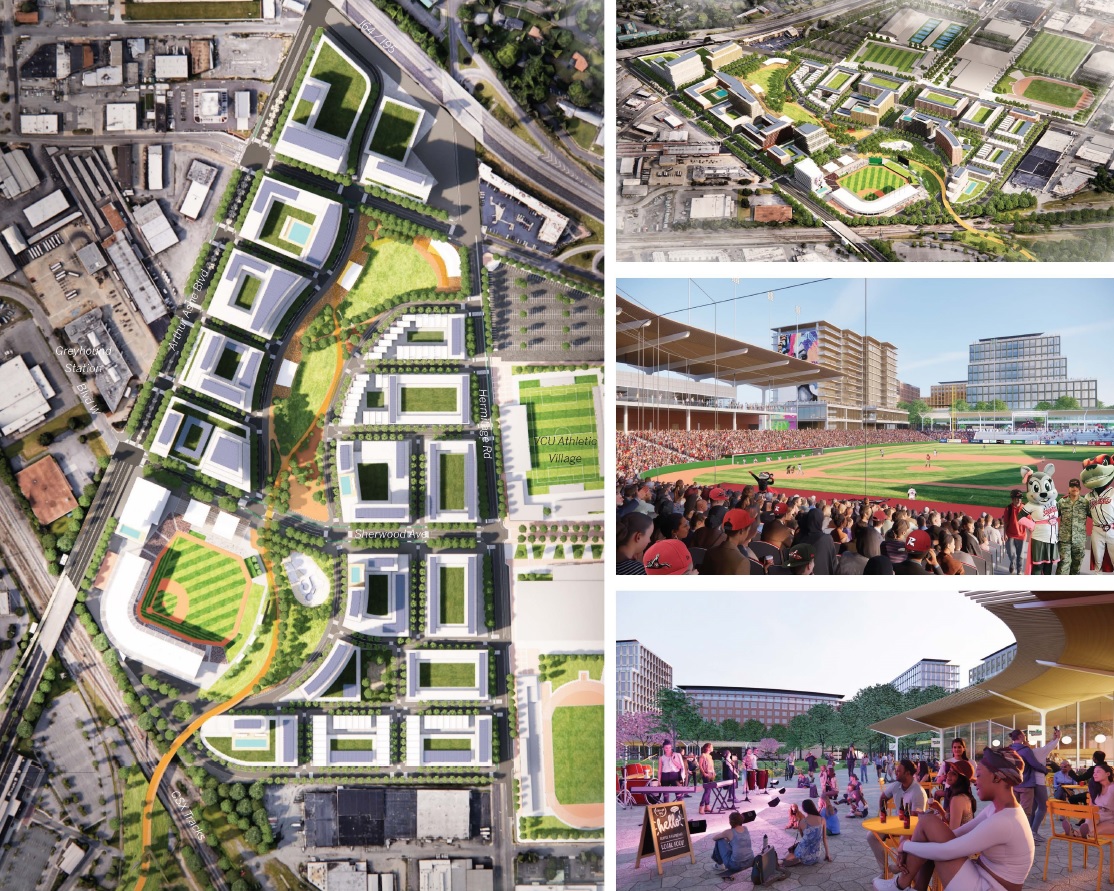
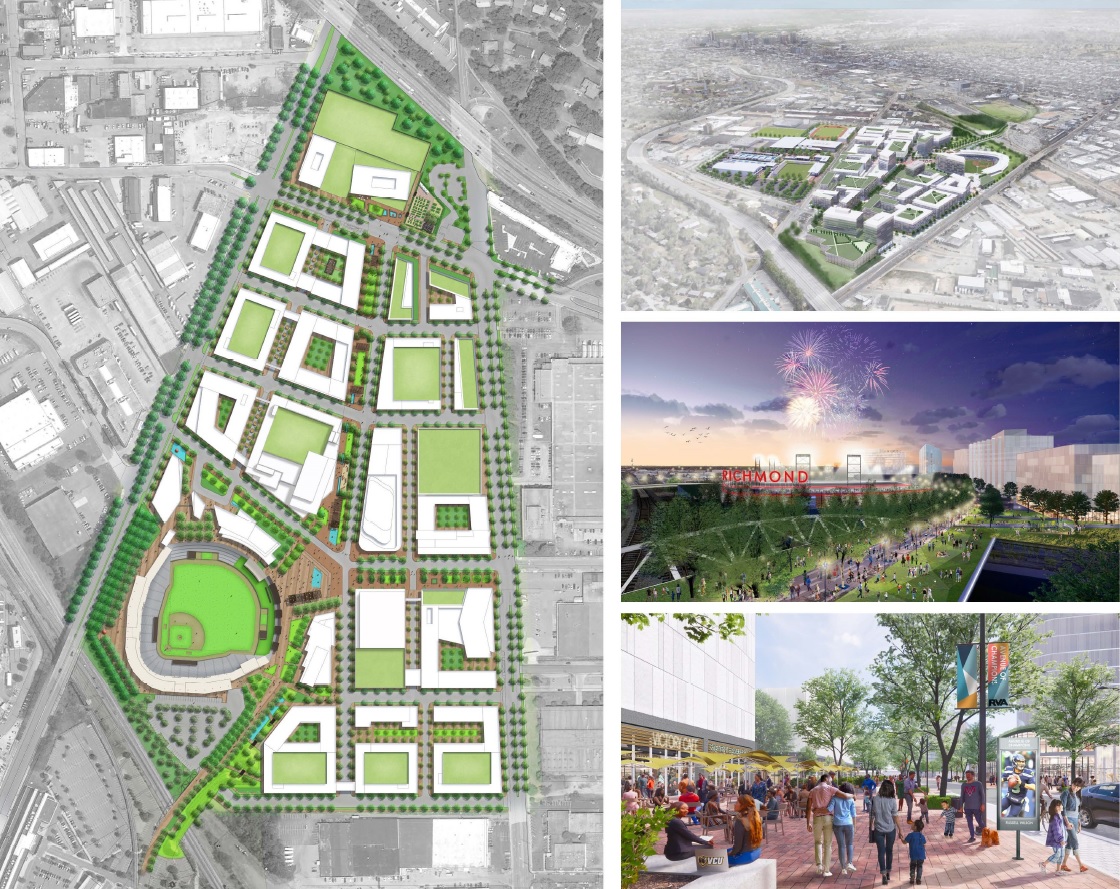
I’m still awaiting the TIF analysis to see how wide a geographic area of the city will be encompassed by each proposal. Logically, it should only affect the area being redeveloped, but that’s not how Navy Hill’s debt obligation was to be set. I’m excited by what I see here, but the devil is always in the details.
Here is a “detail” from the Q/A section. “The City will lead engagement but once a development team(s) is selected, we may need to align community engagement efforts to maximize public input and awareness” In short everything we told residents about the project might change was we select a proposal and we may need to “align” the lies to make sure the public is fooled.
I looked at the conceptual renderings of all three finalists and can’t determine how 6200 plus fans (average attending for Flying Squirrels games) will be able to navigate parking on game days. It appears that there will be bottlenecks everywhere!
Frustrated fans could be a drag on attendance, which would adversely affect the Flying Squirrels bottom line.
This, in my opinion, is a major issue that needs to be addressed.
My guess is this is a very preliminary conceptual rendering not the final product or finished rendering. It’s kind of like a overall master plan rendering of the whole project not the exact specific details of everything which we should be hearing any day now I would think. I’m excited to hear details and numbers of everything in the project.
Interesting to note that the evaluation panel does not include people with expertise in architecture, landscape architecture, or urban design.
No it never does; always city and insider bureaucrats.
Is it even reasonable to expect the evaluation committee members to perform an objective analysis on the proposals? Seems that function would be better outsourced to a third party with nothing to benefit from the outcome with final decisions left to the committee.
no people with development background
Can’t wait to see how RVA politicians screw this up
“can’t wait” because you’re hoping for failure?
Does that really surprise you? Alot of big city politicians are like this. AKA: Never trust big government.
I’m sorry to even write this but from what it looks like, this process looks like it’s going to be a huge mess. This won’t be voted on until the end of the year at the earliest by city council – then how long will it take from there to get a stadium built if it does get approved? Once a proposal is presented to city council – council will likely defer a vote for public input/meetings on the proposal just like what was done with the Navy Hill proposal. If there is ANY public money involved/TIF financing, etc., there… Read more »
I really hope you are wrong, but sadly, you may be correct. It would be such a shame to lose a ball team that’s been promised a new facility since their arrival in 2010.
The Squirrels are a AA team in a AAA market. They are not going to leave Richmond.
I wouldn’t be so sure of that – especially if there is no new stadium built. Relocation is likely an option on the table for the Squirrels – especially with how much they have been jerked around over the years about a new stadium.
I hope not, our metro area really needs the money. My little city of Colonial Heights has done well so far introducing a smaller league team to our historical Shephard Stadium.
They will if the the City can’t or won’t bring the existing facilities up to the newer guidelines, including clubhouse size, food prep and dining space, better training facilities, pitching & batting tunnels. All to satisfy MLB.
respectfully, I ‘m not sure you have the baseball bona fides and knowledge to make that claim. If the decision was solely up to the squirrels ownership, you might be correct. In Feb 2021, MLB ended the agreement that governed the relationship between MLB & the minors, and started running the minors themselves. As part of the restructuring, MLB dropped the affiliations of 40(!!) minor league teams eliminated entire leagues. They also instituted the facilities requirements for all stadiums. I believe it would be foolish to assume after that takeover MLB won’t enforce their own regulations, but hey, Richmond has… Read more »